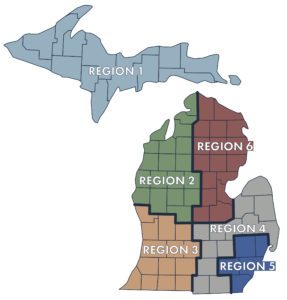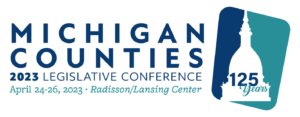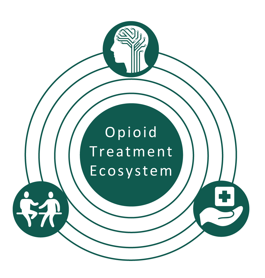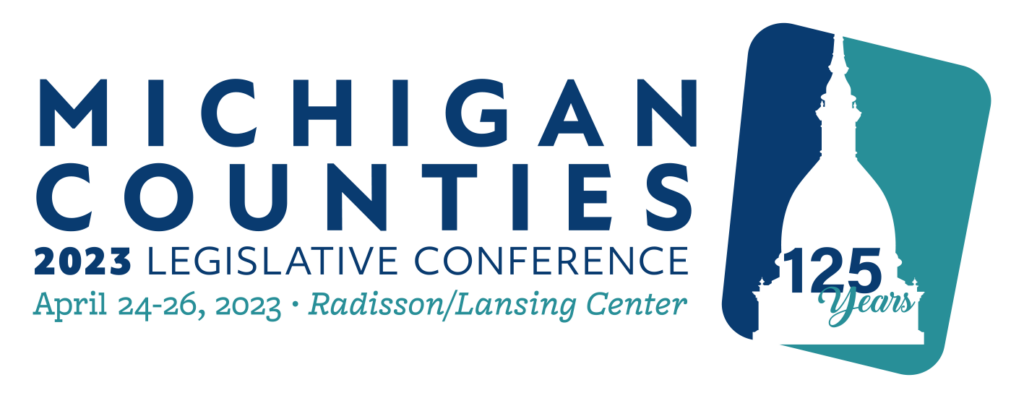2 bill packages could boost or stabilize county revenue
 Two bill packages were introduced in Lansing in late March that could serve to stabilize revenues for counties and create more predictability in revenues.
Two bill packages were introduced in Lansing in late March that could serve to stabilize revenues for counties and create more predictability in revenues.
The first package, Senate Bills 229 and 230, by Sen. Veronica Klinefelt (D-Macomb) creates a “Revenue Sharing Trust Fund,” which is a big priority for MAC this year.
With this trust fund, the legislation would require a percentage of the state sales tax be deposited into the fund and prescribe an equitable distribution from of half to counties and half to cities, villages and townships (CVTs).
If enacted, counties could see an increase of at least 43 percent on their current revenue sharing in the first year alone. Additional increases would be based on the growth of the state’s sales tax.
The bills, developed by MAC in consultation with Sen. Klinefelt and others, have been referred to the Senate Committee on Finance, Insurance and Consumer Protection.
The second package creates an optional structure for the taxes levied on solar facilities in Michigan.
 House Bills 4317 and 4318, by Reps. Curt VanderWall (R-Mason) and Cynthia Neeley (D-Genesee) respectively, would allow for the creation of solar energy districts by local municipalities after a mandatory public hearing. Subsequently, solar energy developers could apply for an exemption from local property taxes and instead pay a flat rate of $7,000 per megawatt of nameplate capacity for the proposed solar energy facility, instead of ad valorem property taxes. The payment would be locked in for 20 years and distributed based on the proportions of normal taxes that would have been paid to each taxing unit.
House Bills 4317 and 4318, by Reps. Curt VanderWall (R-Mason) and Cynthia Neeley (D-Genesee) respectively, would allow for the creation of solar energy districts by local municipalities after a mandatory public hearing. Subsequently, solar energy developers could apply for an exemption from local property taxes and instead pay a flat rate of $7,000 per megawatt of nameplate capacity for the proposed solar energy facility, instead of ad valorem property taxes. The payment would be locked in for 20 years and distributed based on the proportions of normal taxes that would have been paid to each taxing unit.
An additional financial incentive would be offered for developers that choose to site their facilities on brownfield properties, in opportunity zones, as a secondary use on already improved real property (i.e., roof tops) or on state-owned property. In such cases, the reimbursement rate would be $2,000 per megawatt of nameplate capacity.
The impetus behind the legislation is twofold. First, this methodology for compensating locals for lost taxes will provide financial predictability for the developers and the locals, hopefully avoiding the same problems we have had with the challenges to the evaluation of wind turbines. Second, the rate and process should serve as incentives for developers to build more renewable energy facilities.
The bills have been referred to the House Tax Policy Committee. After years of participation on workgroups to ensure local options, a stable funding source, appropriate zoning considerations and adequate local reimbursements, MAC has taken a neutral position on HBs 4317-18.
For more information on these issues, contact Deena Bosworth at bosworth@micounties.org.
Legislative leadership panel will highlight conference’s third day
 Leaders from the majority and minority parties in both chambers of the Michigan Legislature will join MAC for a discussion on their priorities and what has changed in Lansing since Democrats gained the majority in the House and Senate for the first time in 40 years. They also will be asked for their views on a variety of county priorities in 2023. The discussion will be moderated by Deena Bosworth, MAC’s director of governmental affairs.
Leaders from the majority and minority parties in both chambers of the Michigan Legislature will join MAC for a discussion on their priorities and what has changed in Lansing since Democrats gained the majority in the House and Senate for the first time in 40 years. They also will be asked for their views on a variety of county priorities in 2023. The discussion will be moderated by Deena Bosworth, MAC’s director of governmental affairs.
The panel will include:
- House Speaker Joe Tate, D-Wayne
- House Minority Floor Leader Bryan Posthumus, R-Kent
- Senate Majority Leader Winnie Brinks, D-Kent
- Senate Minority Leader Aric Nesbitt, R-Cass
This special session will run from 8:45 a.m. to 9:45 a.m. on Wednesday, April 26.
Other sessions and events not to miss at this year’s conference include:
- “A National Perspective on the County Landscape and Priorities” by Matt Chase, executive director of the National Association of Counties
- A MAC Legislative Update from MAC’s Governmental Affairs staff
- A State of MAC report from MAC Executive Director Stephan Currie
- Remarks from MAC President Stan Ponstein of Kent County
- An “Opioids Help Desk” where MAC’s Amy Dolinky will answers questions on opioid settlement fund planning
- A Legislative Reception on the evening of Tuesday, April 25, during which MAC will present its County Advocate Awards for legislative service in 2022.
HOTEL UPDATE: The main conference hotel is now SOLD OUT. If you still need a room, we recommend contacting the Marriott Courtyard in downtown Lansing (approximately 2 blocks from the Lansing Center) at 517-367-6677.
Click here to register.
See conference agenda.
For additional details on registration pricing, parking and more, visit the conference page on MAC’s website.
Calling for transparency on opioid settlement investments

Last week, following the release of the Michigan Opioid Advisory Commission’s inaugural report calling for increased transparency of state spending, Kaiser Health News (KHN) reported on a need for transparency among state and local governments around opioid settlement funds.
The story was followed up by a Twitter feed outlining core issues and a Michigan Department of Health and Human Services (MDHHS) more detailed spend plan that has not been made publicly available before. The KHN reporter, Aneri Pattani, outlines how challenging it was to obtain this information. The spend plan that KHN was able to obtain differs from the spend plan released to the public by MDHHS on Feb. 10, even though both plans are share the same date.
National guidance from Johns Hopkins Bloomberg School of Public Health outlines five core principles for use of opioid settlement funds. Principle 5 specifies the need for community engagement and transparency in the planning and investment process. The KHN article also links to an interactive map, created by Christine Minhee, founder of OpioidSettlementTracker.com, showing the percentage of funds states have promised to publicly report on, outlining that the state of Michigan has no current plans to report on use of settlement funds.
County leaders should ensure community engagement in their settlement planning and consider ways in which transparency can be provided throughout all steps of the process. Consideration should be given to the different types of publicly available information that can be provided, from open meetings, public meeting minutes, listening sessions, town hall meetings all the way to annual reporting on expenditures and activities.
For assistance on anything related to opioid settlement planning, please contact Amy Dolinky at dolinky@micounties.org.
U.S. Treasury portal now open; P&E reports due by April 30
 “All counties must submit an American Rescue Plan Act (ARPA) State and Local Coronavirus Fiscal Recovery Fund (Recovery Fund) Project and Expenditure (P&E) Report to the U.S. Department of the Treasury (Treasury) by April 30, 2023,” the National Association of Counties reminded in a post this week. “These required, periodic reports provide Treasury with financial and current performance information on projects using Recovery Funds. To help counties navigate the reporting process, the Treasury has released several resources that answer many of counties’ most common questions.
“All counties must submit an American Rescue Plan Act (ARPA) State and Local Coronavirus Fiscal Recovery Fund (Recovery Fund) Project and Expenditure (P&E) Report to the U.S. Department of the Treasury (Treasury) by April 30, 2023,” the National Association of Counties reminded in a post this week. “These required, periodic reports provide Treasury with financial and current performance information on projects using Recovery Funds. To help counties navigate the reporting process, the Treasury has released several resources that answer many of counties’ most common questions.
“The Project and Expenditure Report User Guide takes counties step-by-step through the reporting portal and gives more details on what information Treasury wants for some programmatic questions. The guide includes screenshots of the Treasury Portal, showing counties what questions they can expect to answer for each project. This document is a supplement to Treasury’s compliance and reporting guidance.
“For the April P&E Reports, Treasury announced new information that counties are required to submit: These updates apply to all counties unless a county allocated its entire ARPA allocation towards the $10 million revenue loss standard allowance.
“Please note that there is new information that is required for these April P&E Reports. Counties are now required to include the following information (these requirements DO NOT apply to expenditures that are paid for using lost revenue – EC 6.1):
- Unique Entity ID Requirements for Subrecipients and Contractors: All subrecipients and contractors are required to have a Unique Entity ID (UEI) and have that number included as part of the reporting process. The UEI is the replacement for the previously used DUNS numbers, and they are issued by SAM.gov. While this requirement is not new, starting in April 2023’s P&E Report the report form will now return an error when no valid UEI is provided when creating new Subrecipient or Contractor entities. This was previously not explicitly required, but strongly urged by Treasury.
- Treasury has stated that for the April 2023 P&E reporting form, if a pre-existing subrecipient or contractor record does not have a UEI, the system will simply flag it as a warning but not prevent them from submission of the entire P&E report.
- However, ANY NEW subrecipient or contractor records will be required to have their UEIs provided and they cannot create those entities without one.
- Treasury has stated they DO NOT KNOW how long they will be able to keep this flexibility available after April 2023 so counties should get their UEIs together ASAP.
- New Subaward/Direct Payments Entity Type: All Subawards/Direct Payments records will be required to have an “entity type” selected before a subaward can be created. This field will capture whether the entity receiving the award or payment is a Subrecipient, Contractor, or Beneficiary. If a county attempts to create a new subaward for a subrecipient without a populated entity type field will result in an error.
For more information, please see Treasury’s Recipient Compliance and Reporting Guidance page.
Apply by May 30 for federal grants on EV charging infrastructure

Applications are due by May 30 for a new federal grant program dedicated to electric vehicle charging and alternative-fueling infrastructure. The U.S. Department of Transportation (USDOT) has allocated $2.5 billion for the Charging and Fueling Infrastructure (CFI) Discretionary Grant Program. Counties will be eligible as long as the planned infrastructure is publicly accessible along designated highways, interstates and major roadways.
In February, Gov. Gretchen Whitmer proposed an unprecedented investment in electric vehicles during her budget presentation. Her recommendations included $45 million for local governments to convert their fleets to EVs, $65 million for charging infrastructure both commercially and at-home, $48.8 million to temporarily suspend the sales tax on electric vehicles and $150 million for electric school buses.
As electric vehicles grow in popularity, communities will need to invest in charging infrastructure to accommodate drivers. This grant program is a great opportunity to utilize federal dollars for this essential equipment. Please review the USDOT notice of funding to learn more.
For more information on MAC’s infrastructure efforts, contact Madeline Fata at fata@micounties.org.
NACo extends deadline to apply for Achievement Awards
 The deadline for the National Association of Counties (NACo) Achievement Awards applications has been extended to Friday, April 14 at 11:59 p.m. EDT.
The deadline for the National Association of Counties (NACo) Achievement Awards applications has been extended to Friday, April 14 at 11:59 p.m. EDT.
By participating, your county can earn local and national recognition for your county’s groundbreaking efforts and share ideas with your peers across the country. Achievement Award winners have been featured in local media and in County News. Additionally, NACo often spotlights award-winning programs in congressional testimony and hearings, White House and federal agency briefings, publications, and other county storytelling.
This year, counties will receive recognition in 18 categories covering a wide spectrum of county responsibilities. All winners receive an award certificate and customizable press releases. The 18 “best of category” winners will receive special recognition at the 2023 NACo Annual Conference.
Sta ff picks
ff picks
- Overcoming worker shortages in public sector amidst growing demand (American City and County)
- Governments should compete for residents, not businesses (Governing)
- Raincoats, undies, school uniforms: Are your clothes dripping in ‘forever chemicals’? (Kaiser Health News)
- No April Fools’ prank: Jogger has close encounter with cow (Associated Press)

 Fourteen county commissioners from across Michigan have filed to fill five vacant board seats on the MAC Board of Directors in elections to be held at the 2023 Legislative Conference, April 24-26.
Fourteen county commissioners from across Michigan have filed to fill five vacant board seats on the MAC Board of Directors in elections to be held at the 2023 Legislative Conference, April 24-26. With counties now deep into planning on how to deploy funds from national opioid settlements, the 2023 Legislative Conference will be a great aid to county leaders interested in learning more on the subject.
With counties now deep into planning on how to deploy funds from national opioid settlements, the 2023 Legislative Conference will be a great aid to county leaders interested in learning more on the subject. In a special episode of Podcast 83, MAC’s Deena Bosworth discusses the rising issue of inland lake levels with a legal expert on county responsibilities for lakes.
In a special episode of Podcast 83, MAC’s Deena Bosworth discusses the rising issue of inland lake levels with a legal expert on county responsibilities for lakes. The Michigan Department of Treasury will host the initial webinar to review the Protecting MI Pension: Michigan Local Pension Grant Program on April 6. This initial webinar will focus on the processes that local governments will use to complete and submit an application, along with the process for review and award distribution. Subsequent webinars will focus on technical aspects related to the Protecting MI Pension Grant program, as well as frequently asked questions.
The Michigan Department of Treasury will host the initial webinar to review the Protecting MI Pension: Michigan Local Pension Grant Program on April 6. This initial webinar will focus on the processes that local governments will use to complete and submit an application, along with the process for review and award distribution. Subsequent webinars will focus on technical aspects related to the Protecting MI Pension Grant program, as well as frequently asked questions. Two different packages of bills that create a state Revenue Sharing Trust Fund and direct the expenditures of such a fund have been introduced in the Legislature.
Two different packages of bills that create a state Revenue Sharing Trust Fund and direct the expenditures of such a fund have been introduced in the Legislature. Members of the Michigan Task Force on Juvenile Justice Reform testified before the Senate Committee on Civil Rights, Judiciary and Public Safety this week on the 32 recommendations
Members of the Michigan Task Force on Juvenile Justice Reform testified before the Senate Committee on Civil Rights, Judiciary and Public Safety this week on the 32 recommendations  On March 29, new state legal provisions kick in requiring counties to update their Materials Management Plans (MMP) and increase recycling rates in Michigan.
On March 29, new state legal provisions kick in requiring counties to update their Materials Management Plans (MMP) and increase recycling rates in Michigan. Wayne County officials were called to
Wayne County officials were called to  Major changes are looming for three significant areas of county responsibility, MAC’s Podcast 83 team said this week.
Major changes are looming for three significant areas of county responsibility, MAC’s Podcast 83 team said this week. The Michigan Opioid Advisory Commission released its
The Michigan Opioid Advisory Commission released its  A new regulation to allow child welfare agencies to adopt less stringent licensing standards for all relative and kinship foster family homes was offered by federal officials last month. Counties with foster care jurisdiction are
A new regulation to allow child welfare agencies to adopt less stringent licensing standards for all relative and kinship foster family homes was offered by federal officials last month. Counties with foster care jurisdiction are  National County Government Month (NCGM), held each April, is an annual celebration of county government. Since 1991, the National Association of Counties (NACo) has encouraged counties to actively promote county roles and responsibilities in serving residents. Counties can schedule activities any time during the month. NCGM is an excellent opportunity for your county to highlight effective or innovative county programs and raise public awareness of services provided to the community.
National County Government Month (NCGM), held each April, is an annual celebration of county government. Since 1991, the National Association of Counties (NACo) has encouraged counties to actively promote county roles and responsibilities in serving residents. Counties can schedule activities any time during the month. NCGM is an excellent opportunity for your county to highlight effective or innovative county programs and raise public awareness of services provided to the community. Michigan’s utility regulatory will start requiring a $35 per day credit in power outages, indexed for inflation, a House committee was told Wednesday.
Michigan’s utility regulatory will start requiring a $35 per day credit in power outages, indexed for inflation, a House committee was told Wednesday. Registration opened today (March 10) for the 2023 Michigan Counties Legislative Conference, the first of MAC’s two signature events for our 125th Anniversary year.
Registration opened today (March 10) for the 2023 Michigan Counties Legislative Conference, the first of MAC’s two signature events for our 125th Anniversary year. The Radisson Hotel Lansing at the Capitol is again providing a special group rate for the event and is connected via the newly renovated pedestrian bridge to the Lansing Center itself. The bridge now offers improved lighting, new security systems, ventilation system and carpet.
The Radisson Hotel Lansing at the Capitol is again providing a special group rate for the event and is connected via the newly renovated pedestrian bridge to the Lansing Center itself. The bridge now offers improved lighting, new security systems, ventilation system and carpet. In their regular weekly episode, MAC’s Podcast 83 team discussed the following news involving county governments in Michigan:
In their regular weekly episode, MAC’s Podcast 83 team discussed the following news involving county governments in Michigan: Local governments will be given an opportunity to participate in national Opioid Settlements with Teva, Allergan, CVS and Walmart. Collectively, these settlements are expected to bring in around $450 million to Michigan and will have the same allowable uses of funds as the J&J and Distributors settlements.
Local governments will be given an opportunity to participate in national Opioid Settlements with Teva, Allergan, CVS and Walmart. Collectively, these settlements are expected to bring in around $450 million to Michigan and will have the same allowable uses of funds as the J&J and Distributors settlements. MAC has created supplemental documents to the
MAC has created supplemental documents to the  The nonpartisan
The nonpartisan  A Kent County commissioner and the executive director of MAC were included in appointments by Gov. Gretchen Whitmer for the Michigan State Housing Development Authority (MSHDA) Statewide Housing Partnership.
A Kent County commissioner and the executive director of MAC were included in appointments by Gov. Gretchen Whitmer for the Michigan State Housing Development Authority (MSHDA) Statewide Housing Partnership.





